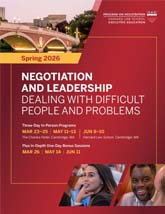Imagine that you’re a freelance marketing consultant who is negotiating the conditions of a long-term assignment with a new client. As you think about what you will charge, you set a goal that you consider to be challenging but not impossible. The project manager balks when you first quote your rate, but you end up negotiating a price and a scope of service that still please you and that seem acceptable to the client.
To your dismay, however, the project manager resists your advice during the early stages of the assignment and, at times, seems downright hostile toward you. The manager ends up taking you off the project prematurely, saying only that the relationship wasn’t a good fit.
There could be many reasons this arrangement failed, ranging from personality differences to unmet expectations. But it is also possible that your high aspirations prior to the negotiation set you up for a partnership that needed to be managed with particular care, suggest researchers Lei Lai (Tulane University), Hannah Riley Bowles (Harvard Kennedy School), and Linda Babcock (Carnegie Mellon University) in a new study.
Abundant research supports the immediate benefits of aiming high in negotiation. But, as we discuss here, challenging goals may negatively affect the relationships that spring from negotiated deals.
The positives of aiming high
When negotiators set specific, challenging goals (such as “I’m going to try to negotiate a rate that’s 10% higher than I’ve earned on past projects”), they consistently achieve better objective outcomes for themselves than do those who set lower or vague goals (such as “I’ll do my best”), researchers Deborah C. Zetik and Alice F. Stuhlmacher of DePaul University found in one review of goal-setting research. Negotiators with relatively high aspirations also contribute to more efficient agreements for both sides.
Challenging goals prompt negotiators to work harder than more modest goals do. Moreover, the simple act of visualizing and committing to a goal helps us anticipate how we will attain it, according to University of Pennsylvania professor Maurice E. Schweitzer.
Goals and a backlash
Despite these beneficial qualities, high aspirations can trigger an unanticipated backlash effect, according to the results of Lai and her colleagues’ study.
The research team assigned pairs of undergraduate students to play the roles of supplier (the seller) and motorcycle manufacturer (the buyer) in a simulated negotiation over a single issue, the price per unit for a special order of headlights. Prior to negotiating, some of the buyers were encouraged to aim for a high target purchase price; the rest were encouraged to adopt a more modest goal. Buyers were encouraged to make the first offer, and sellers were instructed to wait for their buyers’ offers.
After negotiating, those playing the role of seller were given another, supposedly unrelated task: allocating $10 between themselves and another player. Specifically, they were asked to state how much, if any, of the $10 they would give to the person with whom they had just negotiated (the buyer). They were also asked how much, if any, of $10 they would give to an unknown, anonymous participant.
Buyers who set high aspirations in the simulation negotiated significantly better prices for themselves than did those who aimed lower. However, sellers found the buyers who set high goals to be less likable than those who set lower goals, and, as a result, were less willing to cooperate with them in the future.
Managing employees’ goals
A key challenge for managers is to set appropriate goals for employees who negotiate on the organization’s behalf. Unfortunately, “stretch” goals (difficult but not impossible ones) tend to encourage short-term rather than long-term thinking, as well as risky and unethical behavior, according to Lisa D. Ordóñez, Maurice E. Schweitzer, Adam D. Galinsky, and Max H. Bazerman.
To ensure that employees don’t take potentially harmful shortcuts to meet expectations, the researchers advise managers to give long-term rather than short-term goals, establish strong oversight and ethical guidelines, train employees in the skills they need to meet goals, and avoid harsh punishment for failing to meet goals.
Moreover, when it came to allocating $10 after the negotiation had ended, sellers who had negotiated with high-aiming participants were much less generous toward their former counterparts than they were toward unknown participants. In fact, 41% of these sellers gave none of the $10 to their high-aiming counterparts, and only 8% settled on a 50-50 split. Meanwhile, 36% of sellers whose counterparts aimed lower decided on a 50-50 split with these parties.
Set high goals for success
Lai and her team’s findings hint at a dark side to setting high goals in negotiation: namely, high goals seem to work so well that your counterparts may resent your success. As a result, they may find you unlikable, be reluctant to work with you in the future, and behave selfishly toward you when given a chance.
In one-off negotiations where you don’t expect to cross paths with your negotiating counterpart again, it may matter little if he doesn’t like you. But most negotiations, of course, carry at least the possibility of future interactions. If you are happy with your experience negotiating for a new car, for example, you may recommend the dealership to friends or choose to return when it comes time to buy your next car. Thus, it is typically important to look for ways to balance your desire to meet a high goal with the need to build a good relationship.
There are several ways you can try to manage your counterpart’s satisfaction—and odds of cooperating with you in the future—while still aiming high.
Manage wins and losses. Research by Nobel laureate Daniel Kahneman and the late Amos Tversky shows that people prefer to experience several “wins” rather than one, but show the opposite preference for losses. Thus, make concessions, issue rewards, and deliver good news in stages rather than all at once—but convey bad news in one big chunk.
Delay acceptance. A counterpart’s quick acceptance of an offer can cause a negotiator to regret that she didn’t ask for more, Adam D. Galinsky of Columbia University and his colleagues have found in their research. For this reason, even if the other side quickly acquiesces to your high goals, try to prolong the negotiation a bit to improve her overall satisfaction.
Hide your glee. Negotiators tend to be less interested in working again with counterparts who express satisfaction with their results than with those who seem less satisfied, researcher Jared R. Curhan and his colleagues have found. Your satisfaction may lead your counterpart to assume that you took advantage of him. So if you have success meeting your high goals, keep your exuberance to a minimum.
Resource: “Social Costs of Setting High Aspirations in Competitive Negotiation,” by Lei Lai, Hannah Riley Bowles, and Linda Babcock. Negotiation and Conflict Management Research, 2013.
Originally published as “When setting high goals, beware a backlash” in the May 2013 issue of Negotiation Briefings.




